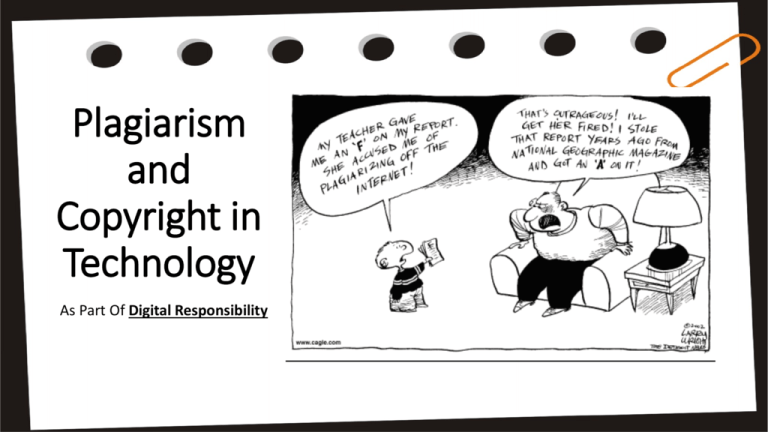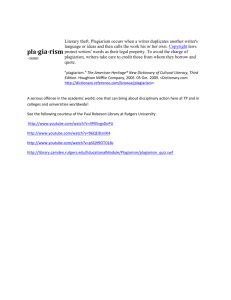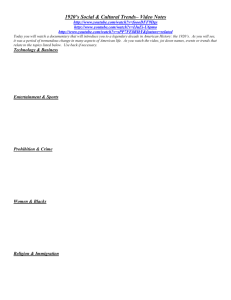
Plagiarism
and
Copyright in
Technology
As Part Of Digital Responsibility
What is Plagiarism?
The act of using another
person’s words or ideas as if
they were your own, without
giving credit to that person
‘plagiarism.’ Mirriam-Webster.com. Merriam-Webster, 2001. Web. 8 March 2015
Dilemma
A college student faces a next day deadline for their Science
paper on Quantum Chemistry. They procrastinated on their
reading, have a Statistics and Physics mid-term the next day,
and have to work the night shift at a gas station that
evening. Like a good student (and questionable employee),
they research online while at work for ideas to supplement
their own thoughts for ideas on a paper and the student uses
these ideas as their own.
Dilemma
The student submits the paper while
giving some credit as ‘Works Cited,’ but
not all sources are given credit. The
student receives a message from their
teacher that they have a meeting with
the Dean and Ethics Board of the
University/College and will find that they
are to be expelled effective immediately.
Is this a realistic situation?
Things to Remember When Submitting
Academic Work
• Give recognition to the author for phrases, sentences, thoughts,
code, software or digital sources which can also take the form of
incomplete footnotes, or endnotes
• Reference appropriately when quoting indirectly, to indicate the
source of the ideas and work of another
• DO NOT submit the same work for evaluation to more than one
course without the consent of each instructor to do so
• DO NOT submit identical work of another student for evaluation
when the work was intended to be completed individually
Giving Credit to Others
• The two most common ways to cite
your sources are in MLA (Modern
Language Association) and APA
(American Psychological Association)
format. The style used will depend
on the course requirements.
• A ‘Works Cited’ page acts as a
bibliography, containing greater
detail of the source material used in
your paper
What should the citations in a
paper look like?
What does a ‘Works Cited’
page typically look like?
- The format of this page is dependant on
the style (ie. APA, MLA) used
- Free webpages such as citationmachine.net
will assist you with the formatting based on
the style, or if the information was
retrieved from a book, magazine,
newspaper, website, journal, blogs, or
other source
- Desktop applications such as EndNote can
assist in organizing your sources. They can
also quickly change the format from APA to
MLA
Plagiarism happens everywhere, even in Canada!
March 18, 2003
Former Australian Prime Minister John Howard
(Held Office March 11, 1996 – December 3, 2007)
“As the possession of weapons of
mass destruction spreads, so the
danger of such weapons coming
into the hands of terrorist groups
will multiply. That is the ultimate
nightmare which the world must
take decisive and effective steps to
prevent. Possession of chemical,
biological or nuclear weapons by
terrorists would constitute a direct,
undeniable and lethal threat to
Australia and its people.”
John Howard
March 20, 2003
“As the possession of weapons of mass
destruction spreads, the danger of such
weapons coming into the hands of
terrorist groups will multiply, particularly
given in this case the shameless
association of Iraq with rogue non-state
organizations. That is the ultimate
nightmare which the world must take
decisive and effective steps to prevent.
Possession of chemical, biological or
nuclear weapons by terrorists would
constitute a direct, undeniable and lethal
threat to the world, including to Canada
and its people.”
Stephen Harper
Canadian Prime Minister Stephen Harper
(Holds Office February 6, 2006 – Current)
An Unfortunate Incident…
Owen Lippert, the staffer who wrote the
speech for Harper resigned stating;
“Pressed for time, I was overzealous in
copying segments of another world
leader’s speech. Neither my superiors in
the Office of the Leader of the
Opposition nor the leader of the
Opposition was aware that I had done
so.”
Ph. D in Modern European History from the
University of Notre Dame - Owen Lippert, 2003
The Speech Continued
Let’s compare
Australian Prime Minister - John Howard
Leader of the Opposition - Stephen Harper
“As the possession of weapons of mass destruction
spreads, so the danger of such weapons coming into
the hands of terrorist groups will multiply. That is the
ultimate nightmare which the world must take
decisive and effective steps to prevent. Possession of
chemical, biological or nuclear weapons by terrorists
would constitute a direct, undeniable and lethal
threat to Australia and its people.”
“As the possession of weapons of mass destruction
spreads, the danger of such weapons coming into the
hands of terrorist groups will multiply, particularly
given in this case the shameless association of Iraq
with rogue non-state organizations. That is the
ultimate nightmare which the world must take
decisive and effective steps to prevent. Possession of
chemical, biological or nuclear weapons by terrorists
would constitute a direct, undeniable and lethal
threat to the world, including to Canada and its
people.”
The Tough Questions…
• Did the staffer, Owen Lippert, do the ‘right
thing’ by resigning from his position?
Why/Why Not?
• In an academic setting, would Stephen
Harper be guilty of plagiarism?
• Were the plagiarised comments harmful
to the general public?
What is Copyright?
Copyright is a legal right created by the law of a country that grants the
creator of an original work exclusive rights to its use and distribution,
usually for a limited time, with the intention of enabling the creator (ex.
the photographer of a photograph or the author of a book) to receive
compensation for their intellectual effort.
What is Fair Use?
Fair Use is a limitation and exception to the exclusive right granted by
copyright law to the author of a creative work. It permits limited use
of copyrighted material without acquiring permission from the rights
holder
Copyright & Fair Use
Copyright and Fair Use (youtube Direct Link)
RECENT NEWS: Robin Thicke & Pharrell Williams
vs the family of Marvin Gaye
In 2013, Thicke and Williams were
sued for their Grammy nominated hit
“Blurred Lines”
The Gaye family claimed it infringed
on Marvin’s 1977 hit, “Got To Give
It Up,” and were seeking damages in
excess of $25 million
Robin Thicke - Blurred Lines VS Marvin Gaye - Got to Gi
RECENT NEWS: Robin Thicke & Pharrell Williams
vs the family of Marvin Gaye
• A jury ruled in favour of the family
for the tune of $7.3 million for
copyright infringement
• ‘Blurred Lines,’ has earned nearly
$16.5 million in profits according
to court documents
• After the verdict, Nona Gaye said,
“Right now, I feel free. Free from
Pharrell Williams and Robin
Thicke’s chains and what they
tried to keep on us and the lies
that were told.”
Marvin Gaye, 1978
Many other songs also share similarities…
Top 10 Rip-off Songs (youtube) ( 14)
Sir Mashalot: Mind-Blowing SIX Song Country Mashup (youtube direct link) (5)
What is Creative Commons?
Creative Commons is a non-profit organization that promotes and
enables the sharing of knowledge and creativity. The organization
produces and maintains a free suite of licensing tools to allow anyone
to easily share, reuse, and remix materials with a fair ‘some rights
reserved’ approach to copyright.
The goal is to maximize digital creativity, sharing, and innovation,
realizing the full potential of the Internet through universal access to
research, education, and full participation in culture.
Creative Commons
Wanna Work Together? (youtube direct link)
Canada’s Copyright Modernization Act
• Act where all provisions went in to effect
January 2nd, 2015.
• Expands the scope of ‘fair use’ for
education, satire, and parody
• Requires educational institutions to
ensure that copyrighted course
materials are destroyed 30 days after
the end of said course
• Requires libraries to place a 5 day time
limit on material borrowed electronically
Canada’s Copyright Modernization Act
• Internet Service Providers and website hosts
are now required by law to relay copyright
infringement notices to their customers. They
serve as a warning from the copyright holder
that illegal activity has occurred from your IP
address and legal action could potentially
follow.
• The law introduces limitations on the amount
of money a copyright holder can potentially
sue for; between $100 - $5,000 for personal
use, and between $500 - $20,000 for
commercial use.
• Based on the act, digital media such as music,
movies, video games, e-books, and
computer applications are all subject to
notices and fines for copyright infringement.
There are penalties for your actions online!
The Tough Questions…
What do YOU think is fair penalty for someone who illegally downloads
a movie? A video game? A song? A Television show?
Do you think there should be a distinction between the type of digital
media being infringed upon, or should all infringement compensation be
the same?
Is online piracy equivalent to shoplifting?
Why do people pirate?
What impact does Creative Commons have
on Copyright?
Remember…
Plagiarism is committed when you do not acknowledge using someone else’s:
- Word or phrases
- Ideas or thoughts
- Term paper
- Recording
- Images
- Computer code
- Experiment results
- Lecture content
- Falsified data, citations or other text
- OR your own previously submitted work.
Remember…
For Copyright issues, be sure to
• Check who owns it
• Give credit to the creator
• Get permission to use it
• Give credit to the creator
• Buy it (if necessary)
• Use it responsibly
Open Discussion
Questions?
Comments?
Concerns?
Works Cited
“Avoiding Plagiarism: Modified APA style of referencing…” McGowan, Hanson, Mirka. (2011) http://schools.cbe.ab.ca/b806/library/Plagiarism.ppt
“Plagiarism,” Dummer, Emeritus. (2010) http://grad.msu.edu/resources/docs/plagaug2010.ppt
“Harper Staffer quits over plagiarized 2003 speech on Iraq,” CBC News. (2003) http://www.cbc.ca/news/canada/harper-staffer-quits-over-plagiarized-2003-speech-on-iraq-1.756590
“Copyright and Fair Use,” Common Sense Education via YouTube. (2014) https://www.youtube.com/watch?v=suMza6Q8J08
“‘Blurred Lines’ Jury Orders Pharell, Robin Thicke to Pay $7.3 Million to Marvin Gaye Family.” Variety. Alex Stedman. (2015) http://variety.com/2015/music/news/blurred-linesverdict-pharrell-robin-thicke-ordered-to-pay-7-3-million-to-marvin-gaye-family-1201450117/
“Robin Thicke: I was too drunk and high to write ‘Blurred Lines,’” Photo via Getty Images. Pagesix (2014) http://pagesix.com/2014/09/15/robin-thicke-i-was-too-drunk-and-high-towrite-blurred-lines/
“Robin Thicke – Blurred Lines vs Marvin Gaye – Got to Give it Up,” Josh Chesterfield via YouTube. (2013) https://www.youtube.com/watch?v=ziz9HW2ZmmY
“Mind-Blowing SIX Song Country Mashup!” Sir Mashalot via YouTube. (2014) https://www.youtube.com/watch?v=FY8SwIvxj8o
“Copyright Modernization Act,” Wikipedia. et al (2015) http://en.wikipedia.org/wiki/Copyright_Modernization_Act
“Share in Creativity.” Creative Commons. (2015) http://creativecommons.org/about
“Wanna Work Together.” Creative Commons via YouTube. (2009) https://www.youtube.com/watch?v=q0VzUigrb_g
“Plagiarism and Cheating,” University Secretariat - Dalhousie University. (2015) http://uwinnipeg.ca/academics/calendar/docs/regulationsandpolicies.pdf





